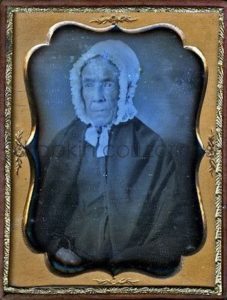
Graces Bustill Douglass
*This date in 1782 is celebrated as the birth date of Grace Bustill Douglass. She was a Black abolitionist and women's rights advocate.
Grace Bustill was born in Burlington, New Jersey, to the Bustill family, a well-known abolitionist family. Her father was Cyrus Bustill, a strong leader in the community and promoter of abolishing slavery. Her mother was Elizabeth Morey, half Delaware Indian and half English. Douglass was one of eight children; she had three brothers and four sisters. Cyrus Bustill was manumitted before marrying his Quaker owner, Thomas Prior, in 1769.
He learned the art of bread-making and eventually opened his bakery in New Jersey. His bakery was successful, which allowed him to provide well for his family. Later, he moved to Philadelphia, where he opened another bakery at 56 Arch Street and met and married Elizabeth.
He was the founder of Philadelphia's Free African Society and opened a school for Black children in 1797. Growing up in Philadelphia allowed Douglass and her siblings to attend one of the few schools for Black children during her time. She also learned a trade and opened a millinery shop on Arch Street next to her father's bakery. In 1803, at 21, she married Robert Douglass, a wealthy barber from St Kitts in the West Indies, and they had six children together.
Not much is known of four of her children, but Sarah and Robert Jr. are well documented. Elizabeth was their eldest daughter; she died young after attending a private school for a few years, being forced to leave the school because the parents of the white students complained. This led Douglass and family friend James Forten to open up a school of their own. Sarah, Robert, and their other siblings received extensive education at this school and private tutors. Like her mother, Sarah became a famous abolitionist and teacher, and Robert was a well-known portrait painter.
Following in her family's footsteps, Douglass also became a devout Quaker. She attended the Society of Friends meetings at the predominantly white meetinghouse on Arch Street. Although she was a devout Friend, she was never allowed membership into the Society of Friends because she was Black. Most Quakers were strong abolitionists during this time, but many still followed segregationist customs. Her meetinghouse followed these customs, separating whites and Blacks into separate sections.
For this reason, all of Douglass's children, except Sarah, left the Friends and joined their father at the First African Presbyterian Church. It was from her life of privilege that Douglass decided to dedicate her life to helping less fortunate people. Douglass and her daughter Sarah met and developed a close friendship with Lucretia Mott and the Grimké sisters, Angelina and Sarah. This friendship eventually led them to create the Philadelphia Female Anti-Slavery Society after they were not permitted to become members of the Anti-Slavery Society in Philadelphia because they were women. Society was involved in different social issues and the abolitionist movement. They fought against slavery and racial and gender discrimination.
The society's constitution was signed in December 1833 by 18 women, including Douglass. The society raised money, spread antislavery texts, and started petitions in Washington, D.C. Society supported the then-radical idea that women should be allowed to vote, speak in public, and become leaders. Because what was essential to society was education. Due mainly to Grace and Sarah Douglass' dedication to educating Black children, the society formed an education committee, which looked after educational facilities for black children around the Philadelphia area. After the Thirteenth and Fifteenth Amendments were ratified in 1865 and 1870, respectively, members dissolved the society since they believed their goal of ending slavery had been achieved.
Douglass was also a member of the Anti-Slavery Convention of American Women, an annual meeting of antislavery societies in the free states. In 1837 and 1839, Douglass was elected vice president for the conventions held in New York. Although Douglass was a Quaker, she was also a delegate at the annual meeting in Philadelphia for the Second African Presbyterian Church with her husband and sister, Mary Bustill. The members of this church thought that equality between the sexes was morally right, and they welcomed women into the organization. Her family was one of the first prominent free Black families in the United States. Her family's history is one of the best documented for a Black family, dating from 1732 until 1925. Grace Bustill Douglass, the great-grandaunt of actor, singer, and political activist Paul Bustill Robeson, died on March 9, 1842.